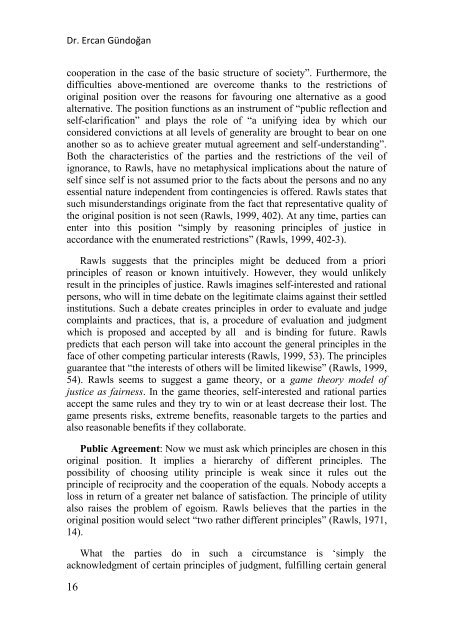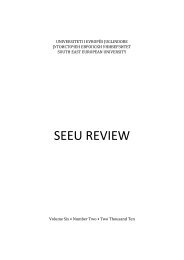SEEU Review vol. 5 Nr. 2 (pdf) - South East European University
SEEU Review vol. 5 Nr. 2 (pdf) - South East European University
SEEU Review vol. 5 Nr. 2 (pdf) - South East European University
You also want an ePaper? Increase the reach of your titles
YUMPU automatically turns print PDFs into web optimized ePapers that Google loves.
Dr. Ercan Gündoğan<br />
cooperation in the case of the basic structure of society”. Furthermore, the<br />
difficulties above-mentioned are overcome thanks to the restrictions of<br />
original position over the reasons for favouring one alternative as a good<br />
alternative. The position functions as an instrument of “public reflection and<br />
self-clarification” and plays the role of “a unifying idea by which our<br />
considered convictions at all levels of generality are brought to bear on one<br />
another so as to achieve greater mutual agreement and self-understanding”.<br />
Both the characteristics of the parties and the restrictions of the veil of<br />
ignorance, to Rawls, have no metaphysical implications about the nature of<br />
self since self is not assumed prior to the facts about the persons and no any<br />
essential nature independent from contingencies is offered. Rawls states that<br />
such misunderstandings originate from the fact that representative quality of<br />
the original position is not seen (Rawls, 1999, 402). At any time, parties can<br />
enter into this position “simply by reasoning principles of justice in<br />
accordance with the enumerated restrictions” (Rawls, 1999, 402-3).<br />
Rawls suggests that the principles might be deduced from a priori<br />
principles of reason or known intuitively. However, they would unlikely<br />
result in the principles of justice. Rawls imagines self-interested and rational<br />
persons, who will in time debate on the legitimate claims against their settled<br />
institutions. Such a debate creates principles in order to evaluate and judge<br />
complaints and practices, that is, a procedure of evaluation and judgment<br />
which is proposed and accepted by all and is binding for future. Rawls<br />
predicts that each person will take into account the general principles in the<br />
face of other competing particular interests (Rawls, 1999, 53). The principles<br />
guarantee that “the interests of others will be limited likewise” (Rawls, 1999,<br />
54). Rawls seems to suggest a game theory, or a game theory model of<br />
justice as fairness. In the game theories, self-interested and rational parties<br />
accept the same rules and they try to win or at least decrease their lost. The<br />
game presents risks, extreme benefits, reasonable targets to the parties and<br />
also reasonable benefits if they collaborate.<br />
Public Agreement: Now we must ask which principles are chosen in this<br />
original position. It implies a hierarchy of different principles. The<br />
possibility of choosing utility principle is weak since it rules out the<br />
principle of reciprocity and the cooperation of the equals. Nobody accepts a<br />
loss in return of a greater net balance of satisfaction. The principle of utility<br />
also raises the problem of egoism. Rawls believes that the parties in the<br />
original position would select “two rather different principles” (Rawls, 1971,<br />
14).<br />
What the parties do in such a circumstance is ‘simply the<br />
acknowledgment of certain principles of judgment, fulfilling certain general<br />
16

















